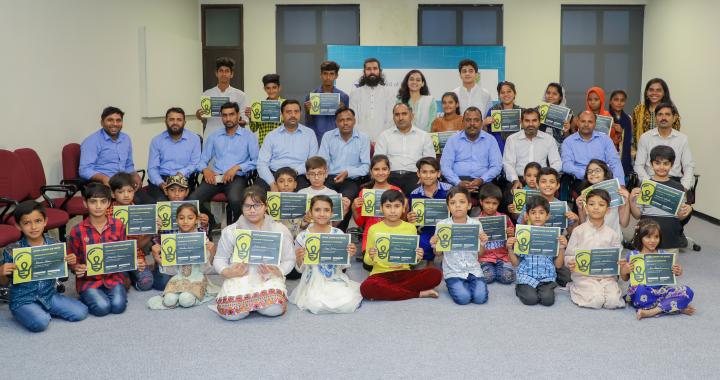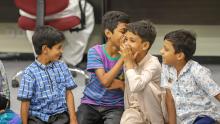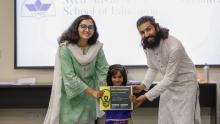
LUMS MPhil ELM students, Sumaiya Faridi and Waqas Manzoor along with an intern Mohammad Saeed Mahmood from Aitchison College led a workshop for the children of the LUMS custodian staff at Syed Ahsan Ali and Syed Maratib Ali School of Education (SOE). The sessions in this workshop were based on 'Artful Thinking Strategies' that were developed by the Harvard Graduate School of Education’s Project Zero. The Project aims to strengthen students’ thinking and learning through visual and performing arts. Each strategy focuses on a disposition or skill such as analysing, problem solving, perspective taking and reasoning.
While sharing her vision for the workshop, Sumaiya Faridi said, “The idea of providing a platform to those children who are yet to experience healthy summer activities motivated us to initiate ‘Socho, Samjho Aur Seekho’, a workshop aimed to strengthen thinking and learning. And what better place to start with, than SOE? We are hoping to see this cause carried forward and bring in more sparkling eyes, filled with a thirst to develop their thinking and learning each year."
Each session began with a warm up portion, followed by two activities. The warm up included several breathing exercises and a molecular walk. The latter required the participants to walk in a circle to a given beat so they could fill the empty space in the circle.
Different activities were carried out each day. One activity involved music visualisation -participants created abstract artwork and emphasised on lines, shapes and colour while listening to music. They also took part in an activity requiring them to pick an animal and depict it through role play. In the ‘Beginning/End/Middle’ activity, participants were shown photographs and were asked to assume the pictures as a beginning, end or middle of a story, and to wonder what might have happened next or before.
Another activity required participants to demonstrate attentiveness and spatial intelligence: one participant was in the centre and the remaining were required to follow whatever he or she did.
In the ‘Telephone’ activity, participants worked in pairs where one child pretended to be on the phone and described the artwork to their partner through facial expressions. In ‘Headlines’, participants were shown artwork and a photograph to discuss in detail with their group and then propose a headline that captured an important aspect of the image.
The last day of the session included a lecture on astrobiology and ocean worlds of the solar system by Rabeea Rasheed, a pioneer in the field of astrobiology at the secondary school level who has been teaching astrobiology at Lahore Grammar School’s EME branch since 2017. Participants were asked to draw pictures of alien life using their imagination. During the ‘Chinese Whisper’ activity, participants practiced active listening as one participant whispered in the ear of the person sitting next to them. The participants observed where they lost their attention, and some even deliberately changed the sentence.
Sumaiya Faridi and Waqas Manzoor conducted a certificate distribution ceremony at the end of the day, where participants accepted certificates in the presence of their parents. The energy was high on all days, clearly evident from the enthusiasm shown by kids and their parents alike.
While waiting to pick his son from the session, Muazzam Ali, who works as a classroom attendant in the LUMS Economics department, said, “This is the first time that kids of the custodian staff are involved in a LUMS activity. Each day, my children are excited to come to LUMS and they wish for the session to be longer.”
Salamat Raza Masi, classroom attendant at SSE said, “Our relatives are congratulating us, and telling us that we are very lucky that our children are getting this exposure at LUMS. We wish this continues in the future as well.”
The parents of the participants believe that art and creativity are an integral part of a child’s learning. However, the schools that their children attend do not provide such opportunities. They felt that the five day workshop had left a deep impact on their children as they became more confident, empathetic, and inquisitive.
The children were also asked about what they learned from the workshop. Their responses covered a wide range, including improved art skills, social skills, team work, creativity, and empathy.
"Children are always full of curiosity and questions,” said Waqas Manzoor, while sharing his thoughts on the impact caused by the workshop. “But it depends on how the people around them cater to this inquisitiveness by gauging the pulse of energy they have and letting them use it for productive thinking. In these five days, we witnessed remarkable creative potential which not only cultivated their thinking but showed mindfulness as well. I believe that change starts with channelling the energy of children”.










